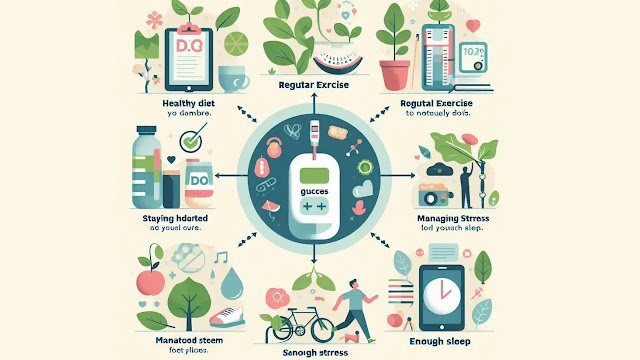How to Lower Glucose Levels: A Comprehensive Guide to Managing Blood Sugar
High blood sugar, also known as hyperglycemia, is when the body has too much glucose (sugar) in the bloodstream. This can happen for various reasons, including prediabetes, type 1 diabetes, and type 2 diabetes. Chronically high blood sugar can lead to serious health complications, so managing glucose levels effectively is crucial.
This guide will explore various strategies to lower blood sugar levels, including dietary changes, exercise habits, lifestyle modifications, and potential supplements. Remember, this information is not a substitute for professional medical advice. Always consult your doctor before making significant changes to your health regimen.
Understanding Blood Sugar Levels
Blood sugar levels naturally fluctuate throughout the day, but staying within a healthy range is essential. Doctors typically measure blood sugar in milligrams per deciliter (mg/dL). Here’s a general guide:
- Normal: Less than 100 mg/dL before eating (fasting)
- Prediabetes: 100 to 125 mg/dL before eating
- Diabetes: 126 mg/dL or higher before eating
Dietary Strategies for Lowering Blood Sugar
- Focus on Complex Carbohydrates: Simple carbohydrates like white bread, pastries, and sugary drinks spike blood sugar rapidly. Instead, opt for complex carbohydrates found in whole grains, vegetables, and legumes. These provide sustained energy and promote healthy blood sugar levels.
- Increase Fiber Intake: Fiber slows down digestion and sugar absorption into the bloodstream. Include fruits, vegetables, whole grains, and legumes in your diet for a good fiber source.
- Limit Sugary Drinks and Processed Foods: Sugary drinks and processed foods are loaded with added sugars that significantly elevate blood sugar levels. Cutting back on these is a significant step towards managing glucose levels.
- Choose Lean Protein Sources: Lean protein sources like fish, poultry, and beans help with feeling full and can reduce cravings for sugary snacks.
- Portion Control: Be mindful of portion sizes. Even healthy foods can cause blood sugar spikes if consumed in excess.
Exercise for Blood Sugar Control
Regular exercise is a powerful tool for managing blood sugar. Here’s how it helps:
- Improves Insulin Sensitivity: Exercise makes your cells more receptive to insulin, allowing them to absorb glucose from the bloodstream more effectively.
- Lowers Blood Sugar Levels: Physical activity uses glucose for energy, naturally reducing blood sugar levels.
- Aids in Weight Management: Maintaining a healthy weight reduces the risk of diabetes and improves overall blood sugar control.
Aim for at least 150 minutes of moderate-intensity exercise or 75 minutes of vigorous exercise per week. Speak with your doctor to create a safe and effective exercise plan.
Lifestyle Modifications for Healthy Blood Sugar
Manage Stress: Chronic stress can elevate blood sugar levels. Explore stress-reduction techniques like yoga, meditation, or deep breathing to manage stress effectively.
Prioritize Sleep: Getting enough quality sleep is crucial for overall health, including blood sugar regulation. Aim for 7-8 hours of sleep each night.
Stay Hydrated: Drinking plenty of water helps your body flush out excess sugar through urine. Aim for eight glasses of water daily.
Consider Supplements: Some supplements like chromium and magnesium may benefit blood sugar control. However, consult your doctor before starting any supplements.
Monitoring Blood Sugar Levels
Self-monitoring of blood sugar levels allows you to track your progress and adjust your management strategies as needed. There are various blood sugar meters available, and your doctor can guide you on proper usage.
Remember:
- These strategies are generally helpful for managing blood sugar levels.
- Consult your doctor for personalized guidance based on your specific condition and medical history.
- A combination of dietary changes, exercise, and medication (if prescribed) is often the most effective approach to managing blood sugar effectively.
By implementing these strategies and working with your doctor, you can take control of your blood sugar levels and achieve a healthier lifestyle.

